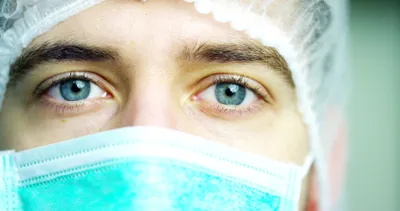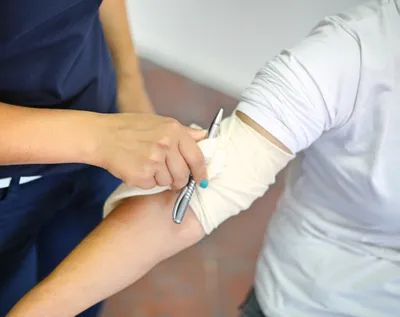If it’s on television, it must be right, right? Not always. There are a growing number of medical dramas that are supposed to be showing us the inner workings of the medical profession, whereas they’re miles off from reality.
Let’s be honest: these types of shows—as well as charismatic doctor shows that have a live audience on daytime television—often put showmanship above facts. In fact, in the case of the most popular daytime health “experts”, one study posted on IFLScience.com notes that at least half of the advice given on them is “wrong or lacks evidence”. Let’s take a look at some medical facts presented on the screen that differ from real life…
1. Miracle Heart Attack Treatment
KevinMD.com notes in an article that when people clutch their chest in obvious cardiac arrest on a television show, a doctor (or a civilian) gives them “a minute of (sub-par) CPR and a shock” and then the patient awakes unscathed.
The reality is in many cases, CPR won’t do the trick, and people are often shocked to lose a loved one in real life because they’re convinced the television method works miracles, adds the source. That being said, the site recommends you learn CPR in any case, because it still saves about 10-percent of lives when it occurs outside of a hospital.
2. Extreme Childbirth
“Of all the medical myths perpetrated by TV and film, giving birth ranks near the top,” explains Salon.com. It’s not about screaming at the top of your lungs for a short period of time and having a baby shoot out like a cannonball, it explains.
The reality of giving birth is a longer labor, with more controlled breathing and more energy focused on the pelvis (instead of uncontrollably writhing on the bed like in movies). But hey, we get it—some labors last hours and hours, and if you only have 30-minutes for your show, then you need to make it quick and memorable.
3. Solo Surgeries
Dr. Nikki Stamp says on her website that there’s no way an intern would be performing a surgery on their own, like they have apparently done on popular medical dramas. “Interns do not do surgery alone. Even if they are getting it on with McDreamy,” notes the post. There would always be someone more experienced guiding the procedure, she added.
Speaking of McDreamy, this perfect character doesn’t exist in the medical world, adds Dr. Stamp. The reality is that doctors are “a great big bunch of nerds” that is more concerned with their practice than having perfect hair and makeup. “Doctors may scrub up all right but by and large, work is work and scrubs look good on nobody,” she quips.
4. Wrongly Applied Tourniquets
You’ve seen it in the movies—the action hero has a gaping wound caused by a bullet or mythical creature, and he or she somehow managed to apply a tight tourniquet (ripping the bandage with their teeth, no less) to stop the bleeding.
However, as ListVerse.com points out, this procedure is actually “highly controversial among experts” because it can cut off blood flow that builds up toxic substances, which can be fatal to the patient when the bloodflow is restored. Apparently many countries have removed the application of a tourniquet from first-aid procedures as a result (except in extreme situations).
5. Freezing Severed Digits
ListVerse.com also notes that another common myth in medical shows is freezing severed toes and thumbs to bring to the hospital for what’s assumed will be a simple reattachment procedure. However, the source says to put that idea on ice.
“While it is advisable to keep the object in question cool (and germ free), actually freezing it would cause irreparable cell damage, especially in cases of direct contact to the ice,” notes the source. So yes, saving a finger is possible, but perhaps don’t use the beer cooler full of ice, that was next to the barbecue where your slightly inebriated buddy accidentally sliced his thumb off while cutting a chicken into quarters.
6. Pushing Miracle Diet Solutions
Sometimes when we hear of a trendy health craze, we expect it to come from a celebrity with no formal health background (cough *Gwenyth Paltrow* cough) rather than someone who actually has some kind of medical degree.
That being said, one talk show doctor who we won’t name (cough *Dr. Oz* cough) actually ended up in senate subcommittee hearing in 2014 defending himself for potentially false claims about weight loss and dietary supplements he praises on his show. In particular, he called green coffee extract a “magic weight loss cure for every body type,” which garnered some criticism from the panel, to say the least.
7. Doctors That Do it All
We love our doctors—they are often heroes in white coats. However, contrary to what medical dramas depict, the doctor will not be at the patient’s side for every step of their medical journey while holding their hand, points out ULoop.com.
“In reality, nurses actually do almost everything in hospitals,” explains the source. There are a number of different specialists a patient may see throughout their treatment, and the same doctor won’t retrain overnight to be able to handle every patient (and perform every procedure), it adds.
8. Medical Staff That Regularly Get it On
This may be a bit disappointing for romantic junkies, but there aren’t tons of hook-ups taking place between medical personnel in staff rooms at the hospital, especially between higher-ups and underlings, adds ULoop. “In most hospitals relationships with a superior are a big no-no,” it explains.
Also, doctors and residents don’t regularly get to fraternize outside of a professional setting, it adds. “They don’t and aren’t able to leave the hospital at the same time,” according to the source. However, ULoop does admit there could be a lot of lovin’ goin’ on during the med school years. Here’s lookin’ at you, McDreamy.
 Editorial credit: s_bukley / Shutterstock, Inc.
Editorial credit: s_bukley / Shutterstock, Inc.









